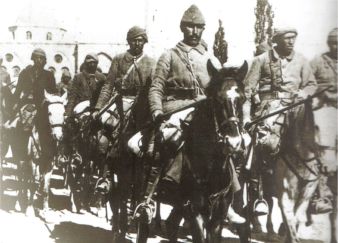You are using an out of date browser. It may not display this or other websites correctly.
You should upgrade or use an alternative browser.
You should upgrade or use an alternative browser.
The Union Forever: A TL
- Thread starter Mac Gregor
- Start date
Threadmarks
View all 449 threadmarks
Reader mode
Reader mode
Recent threadmarks
The African War: 2025 2025: Foreign and Domestic Developments 2026: Foreign and Domestic Developments Culture: Dreamworld's The Presidents (2025-2026) 2027: Foreign and Domestic Developments Culture: Asia-Pacific War Films from the Sub-continent Culture: The Old Earth Chronicles World Map 2027bump it up.
Working on the next update (Austria-Hungary and the Balkans), hope to have it in the next few daya. Cheers!
Last edited:
I can't imagine the Entente holding out much longer, they should crack within a year.
Well it looks like Napoleon really has finally lost his s**t now...cue the swan song for the Entente 
I'm still skeptical of whether there will be a WWII in this timeline, at least as we would understand it. There's the beginnings of a Pacific War analogue that we can see now that Japan has been forced out of the fighting, but as far as Europe goes we'll just have to see how things pan out post-War and how harsh peace will be on France and Company.
Anyways, outstanding work!!!
I'm still skeptical of whether there will be a WWII in this timeline, at least as we would understand it. There's the beginnings of a Pacific War analogue that we can see now that Japan has been forced out of the fighting, but as far as Europe goes we'll just have to see how things pan out post-War and how harsh peace will be on France and Company.
Anyways, outstanding work!!!
Consider this AH BUMPED
You raised my hopes and dashed them against the ground quite thuroughly.
Hey everyone, sorry for the delay, i have been busy. I will do my best to post the next chapter this weekend. Cheers!
Hey everyone, sorry for the delay, i have been busy. I will do my best to post the next chapter this weekend. Cheers!
yay!!!!!!!
The Great War: Austria-Hungary July 1909- February 1910
The Hungarian Offensive
and the
Battle of Budapest
and the
Battle of Budapest
July 1909- February 1910

The City of Budapest before the Battle
1909
In the West as American and British forces poured into Prussia and began to push the French back towards the Rhine, the Russian and Austro-Hungarian Empires were locked in a death match in the East. The Hapsburg’s had ruled their central European empire in some form or another since the reign of Rudolf I, over 600 years ago. Now, with the Coalition advancing and many of their disenfranchised subjects rising against them, the Hapsburgs could only fight on against what must have seemed like a Russian wave crashing over them.
The Russians resumed their push into Hungary in August of 1909. Three massive Russian armies totaling over 1 million men and supplemented by their Romanian, Serbian, and Bulgarian allies took part in the offensive. The Austro-Hungarians were forced to redirected hundreds of thousands of troops from their fronts in Bavaria and northern Italy to try and cope with the onslaught. By early January, 1910 the Russians had made their way to the outskirts of Budapest. The Battle of Budapest would prove to be the climax of the Hungarian offensive and one of the largest and deadliest battles of the Great War. As the capital and largest city of the constituent Kingdom of Hungary, Budapest had enormous importance to the Austro-Hungarians. Likewise, the Russians believed that after the capture of Budapest, the other non-Austrian subjects of the Austro-Hungarian Empire would read the writing on the wall and desert their German speaking overlords. The battle would last for roughly two months as the Russians were able to eventually encircle the city despite growing troubles with the long and precarious supply lines. Even after the city was surrounded, the half on the western bank of the Danube River (the historical city of Buda) would not officially surrendered to Russian General Alexi Brusilov until February 27, 1910. With Budapest and most of Hungary now in Coalition hands, Austro-Hungarian Emperor Maximilian began to look for a way for his country to exit the war while still preserving the dual monarchy.
Turkish Reversals
With the Russians making headway into Kurdistan, the Arab provinces in revolt, and ever smaller amounts of aid coming from France, the Ottoman Empire in the Autumn of 1909 began a fighting withdraw from much of its European holdings as the Turks decreasing resources were badly needed elsewhere. For the Bulgarians, Serbs, and Greeks who had been on the ropes fighting the Sublime Porte for years, the Turkish withdrawal was a godsend. By 1910 the Turks had largely stopped falling back and were digging in to protect their remaining European territory as illustrated by the Battle of Plovdiv in the early days of February, 1910 when a Russo-Bulgarian army was badly mauled after attempting to cross the Maritsa River.

Turkish troops defending the Maritsa River
February, 1910
Last edited:
I'm starting to wonder whether Turkey will end up the secular republic it is IOTL, or as an Islamic-extremist s**thole, or even as a Russian satellite/vassal at this point. As it is, I don't see the Bolsheviks having the same traction ITTL as in OTL due to the greater success Russia seems to be having in the war.
The Great War: Mediterranean and Middle East June 1909 - May 1910
The Mediterranean
and
the Middle East
and
the Middle East
June 1909-May 1910

Cavalry during the Battle of Jeddah
June, 1909
The Arab Revolt
Since the start of the Great War, the Ottoman Empire’s relations with the Arab tribes that inhabited the interior of the Arabian Peninsula had deteriorated dramatically. Starting in 1908, Hashemite forces in the Hejaz under Sayyid Hussein bin Ali joined the Coalition and proceeded to try and drive the Turks from Arab lands. Although at first the Arab rebels meet with little success due to lack of munitions and supplies, aid from Prussia, and later Britain and the United States eventually allowed the Arabs to start gaining ground. In June of 1909 the important Arabian port of Jeddah was captured. Over the next few months the Muslim holy cities of Mecca and Medina would also fall to rebel hands. Throughout the campaign the Arabs were assisted by a number of European officers, the two most famous being Prussian Captain Theophil Schoenfeld and British Major Kian Hawkins who would make a name for themselves by adopting Arab costumes and customs in order to gain their soldiers trust. By the Spring of 1910, Arab forces had driven the Turks completely out of the Arabian Peninsula and were preparing to advance into Ottoman controlled Palestine.
The Invasion of Egypt
As French possessions in the rest of Africa were continuing to fall to the Coalition, the British decided to embark on Operation Marlborough, the invasion of the French colony of Egypt. Having been part of the French Empire since the 1880’s, Egypt’s most important feature was the Suez Canal which if captured would allow the Coalition, who already controlled Gibraltar, greater access to the Mediterranean Sea. On January 13, 1910 a composite force under the command of British General Robert Baden-Powell but composed mainly of Australian and New Zealand troops landed near the port of Suez on the Red Sea. Although the landing came under intense shellfire, Coalition forces were able to seize the city by the end of the day. Over the next two months over 150,000 Coalition troops would land and fight their way north up the canal to Port Said. Although the French scuttled ships and tried to damage the canal to make in inoperable for Coalition use, they were only moderately successful. On March 30th, 1910 Coalition forces captured Cairo after a brief but intense siege. With Egypt and its canal no longer under Entente control, the Coalition could now dramatically expand its naval presence in the Mediterranean and deliver much needed supplies to its southern European allies.
Italy Reenters the War
Italy had undergone a transformation since the signing of the Treaty of Milan in February of 1908 which had taken the Mediterranean kingdom out of the war. Many Italians felt deeply betrayed by the monarchy for signing the treaty and longed to regain their lost northern provinces. On May 16, 1908 Queen Lucia was overthrown by a popularly backed military coup, and was force to flee to Spain. Within days the Italian parliament abolished the monarchy and the Republic of Italy was proclaimed. As the war waged on in Europe, Italy busied itself by rearming and retraining its battered army, a task which proved difficult since the most industrialized regions of the country were under enemy occupation. Throughout this period, known in Italy as La Tregua “The Truce”, the Italian military was put under the command of Generalissimo Brancaleone Lucchesi. Lucchesi had distinguished himself earlier in the war against the French and Austro-Hungarians and had successfully led his army corps south to safety following the armistice. Lucchesi would use his corps as the nucleus to build the new Italian Army around. An ardent republican, a notable rarity in the old monarchist army, the popular Lucchesi was an enormous asset in recruiting troops and bolstering the moral of the Italian people. Also during La Tregua Lucchesi did all he could to aid the Italian guerrillas in the mountainous regions of occupied northern Italy. With aid from southern Italy these guerrillas were exacting an increasingly severe toll on the French and Austro-Hungarian occupiers.
By the spring of 1910, the Italian army had largely regained its former strength and was determined to liberate northern Italy. News of the capture of Egypt and the steady stream of Entente reversals in Germany and Hungary finally convinced the Italian government and Lucchesi that the time was right to rejoin the Coalition. On May 5, 1910 roughly two years after the signing of the Treaty of Milan, the Italian government declared war on the Entente powers with Generalissimo Lucchesi making his famous statement “May Emperors tremble at sounds of freemen no longer slaves breaking their chains!”
Last edited:
and the axe is almost ready to fall on the head of the entente, this is simply fantastic with the loss of Egypt and Hungary it surly cannot be long before the entente is forced to sue for peace and it is very good to see such a strong show of British strength which will only help its prestige unlike in OTL with such massive failures like Gallipoli which only helped to weaken the empire, it will be interesting to see how the empire stands after the war
Just a little nitpick Truce in italian is translated 'Tregua', except this good update as usual, and ironicaly Brancaleone is just the perfect name for a italian general in this situation
http://en.wikipedia.org/wiki/Brancaleone
http://en.wikipedia.org/wiki/Brancaleone
Italy TTL reminds me of Napoleonic Prussia; severely humiliated by France, yet rising at the climax to be an important part of the Coalition.
Threadmarks
View all 449 threadmarks
Reader mode
Reader mode
Recent threadmarks
The African War: 2025 2025: Foreign and Domestic Developments 2026: Foreign and Domestic Developments Culture: Dreamworld's The Presidents (2025-2026) 2027: Foreign and Domestic Developments Culture: Asia-Pacific War Films from the Sub-continent Culture: The Old Earth Chronicles World Map 2027
Share: